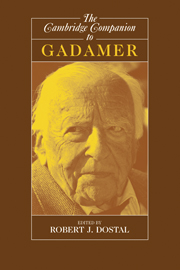Book contents
- Frontmatter
- Introduction
- 1 Gadamer
- 2 Gadamer’s Basic Understanding of Understanding
- 3 Getting it Right
- 4 Hermeneutics, Ethics, and Politics
- 5 The Doing of the Thing Itself
- 6 Gadamer on the Human Sciences
- 7 Lyric as Paradigm
- 8 Gadamer, the Hermeneutic Revolution, and Theology
- 9 Hermeneutics in Practice
- 10 Gadamer’s Hegel
- 11 Gadamer’s Relation to Heidegger and Phenomenology
- 12 The Constellation of Hermeneutics, Critical Theory, and Deconstruction
- Bibliography
- Index
10 - Gadamer’s Hegel
Published online by Cambridge University Press: 28 May 2006
- Frontmatter
- Introduction
- 1 Gadamer
- 2 Gadamer’s Basic Understanding of Understanding
- 3 Getting it Right
- 4 Hermeneutics, Ethics, and Politics
- 5 The Doing of the Thing Itself
- 6 Gadamer on the Human Sciences
- 7 Lyric as Paradigm
- 8 Gadamer, the Hermeneutic Revolution, and Theology
- 9 Hermeneutics in Practice
- 10 Gadamer’s Hegel
- 11 Gadamer’s Relation to Heidegger and Phenomenology
- 12 The Constellation of Hermeneutics, Critical Theory, and Deconstruction
- Bibliography
- Index
Summary
“So muße vor allem Hegels Denkweg erneut befragt werden.” (“Above all else, the path of Hegel’s thought must be interrogated anew.”) (GW 2, 505)
Gadamer's philosophical hermeneutics is as much a reaction as an initiation: a reaction against a relativistic historicism that “locked” speakers and actors “inside” worldviews; a reaction against the overwhelming prestige of the natural sciences and the insistence on methodology inspired by that success; and a reaction against the “bloodless academic philosophizing” of neo-Kantian philosophy and its perennialist “great problems” approach to the history of philosophy. But in several of his autobiographical remarks, Gadamer singles out an opponent that seems to loom oddly large in his reminiscences about provocations. “Using Heidegger's analysis, my starting point was a critique of German Idealism and its Romantic traditions” (PG 27), he writes in one such recollection. And in the same essay, he writes of trying to avoid or to “forfeit” (einböußen) “the fundamentum inconcussum of philosophy on the basis of which Hegel had written his story of philosophy and the Neo-Kantians their history of problems - namely, self-consciousness” (PG 7).
- Type
- Chapter
- Information
- The Cambridge Companion to Gadamer , pp. 225 - 246Publisher: Cambridge University PressPrint publication year: 2002
- 9
- Cited by

